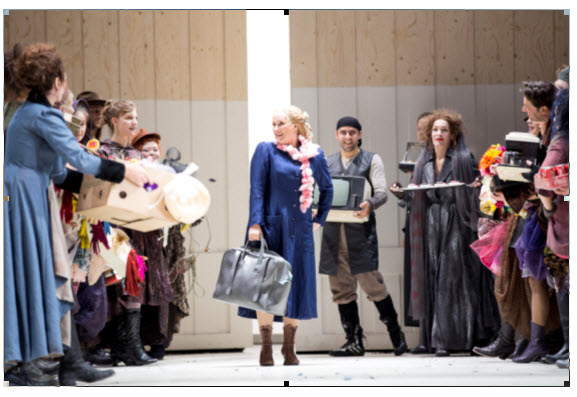 Austria Iain Bell: A Harlot’s Progress, Wiener Symphoniker, Arnold Schoenberg Choir, Mikko Franck (conductor), Theater an der Wien, Vienna, 13.10.2013 (JMI).
Austria Iain Bell: A Harlot’s Progress, Wiener Symphoniker, Arnold Schoenberg Choir, Mikko Franck (conductor), Theater an der Wien, Vienna, 13.10.2013 (JMI).

World Premiere
Cast
James Dalton: Nathan Gunn
Kitty: Tara Erraught
St. John Lovelace: Christopher Gillet
Mother Needham: Marie McLaughlin
Coachman/Officer/Jailer: Nicolas Testé
Production
Direction: Jens-Daniel Herzog
Sets: Mathis Neidhart
Costumes: Sibylle Gädeke
Lighting: Jürgen Koss
Attending the world premiere of an opera is always a special occasion, and even more so if it is the first opera by its composer. If one adds to all this the fact that the venue is the Theater an der Wien, whose history is filled with premieres of musical masterpieces, the cup of interest cannot be more full of curiosity and expectations.
First of all I must say that the premiere of A Harlot’s Progress was a success, something that is much needed in the world of opera in the times in which we live. It was really a remarkable musical performance with a convincing stage production and an excellent cast, headed by the superlative Diana Damrau.
The young British composer Iain Bell has in the past written several cycles of songs, some of which Diana Damrau has performed. His first opera will be followed in December 2014 by the Houston premiere of A Christmas Carol.
A Harlot’s Progress, with a superb libretto by English playwright and novelist Peter Ackroyd, is based on six engravings by William Hogarth that illustrate the sad story of Moll Hackabout. (Another series of engravings by Hogarth had inspired Igor Stravinsky’s The Rake’s Progress.) Ackkroyd’s libretto is a marvel of drama and concision, and describes Moll’s life from her arrival in London through all the stages of prostitution to the birth of her daughter in terrible conditions and her tragic death from syphilis.
Bell ‘s music is much more accessible than that of some other contemporary composers, and it allows the artists to fully exercise their profession and really sing. The music mirrors the drama of the libretto and holds the audience’s interest, except perhaps in the third scene, when Moll dreams of returning to her native Yorkshire. The dramatic tension built in the second part of the opera, especially the aforementioned death scene and the shocking final scene, Moll’s burial, when her daughter appears dressed as Moll was on her arrival in London. Thus the circle of the drama closes with a new victim in the person of Moll’s daughter. From my point of view A Harlot ‘s Progress, together with Written on Skin by George Benjamin, are the great successes of contemporary opera and, interestingly, both are signed by by British composers.
The stage direction is by Jens-Daniel Herzog, and it contributes greatly to the success of the performance. Herzog narrates with sometimes excessive crudity the plot of the libretto, and nobody gets bored. This is a minimalist production that takes place on a stage enclosed by wooden walls, to which props are added, especially beds which range from luxurious to rattletrap, reflecting Moll’s inexorable fall. The best part of the stage production is the magnificent work that Herzog does with the singers, especially with regard to the protagonist.
It was initially announced that Donald Runnicles would conduct, but he withdrew a month ago for family reasons. His replacement was Mikko Franck, currently music director of the Helsinki Opera. This is not an easy opera to conduct, and Franck did a praiseworthy job, always maintaining the tension and carefully supporting the singers. Under his baton were the remarkable Wiener Symphoniker and the excellent Arnold Schoenberg Choir.
In recent years, Diana Damrau has become one of the most sought-after sopranos, and her interpretations are authentic bel canto singing in the best tradition. Is there a better Lucia today than hers? And the same could be said of her many other roles, from Amina to Zerbinetta. As a side note, Damrau will open the opera season at Milan’s La Scala as Violeta.
Given her background, one might wonder what tempted her to take on Moll Hackabout. There is of course her relationship with the composer; she has performed his song cycles on numerous occasions. Furthermore, I am convinced that Iain Bell wrote this opera with Damrau in mind and, simply stated, she has proved to be a magnificent singing actress. Every opera aficionado knows her reputation as a vocalist and her remarkable stage presence, but her interpretation of Moll was irresistible. The character has a lot to sing and that is not a problem for Damrau, but she also has a lot of emotions to convey, and in this respect Damrau was just sublime. The death scene was breath-taking. I think it will not be easy for any other soprano to sing this role, such is the identification between Moll Hackabout and Diana Damrau, but I believe that Barbara Hannigan could take on the challenge.
American baritone Nathan Gunn was well-cast as James Dalton, the pimp who takes advantage of poor Moll. He has a strong voice, and his stage performance was very convincing. I should also mention Irish mezzo soprano Tara Erraught as Kitty. Both vocally and dramatically her performance was flawless; her voice is attractive and homogeneous through the tessitura.
Tenor Christopher Gillett was less satisfactory in the character of Lovelace. His voice does not go beyond a comprimario and the role requires more than this. Marie McLaughlin was good as Mother Needham, and bass Nicolas Testé did a fine job in the different roles he played.
Theater an der Wien was at about 95% of capacity. The audience was very warm at the final bows and gave a triumphal reception to Diana Damrau. There were also cheers for Tara Erraught, Mikko Franck and the creative team. Finally, Iain Bell was greeted with enthusiasm, apart from some isolated booing.
José Mª Irurzun